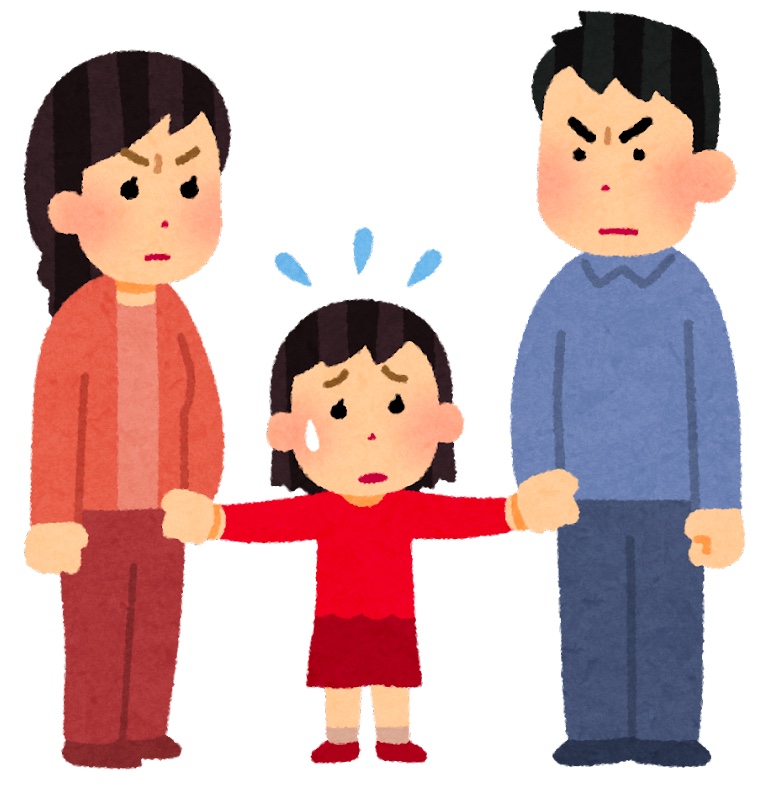- Why mothers are favored in custody disputes?
- Points on which mediation and courts in Japan determine custody:
- With whom does the child live.
- Whether the parents have been the primary caretakers of the child
- With whom does the child want to live?
- Whether or not the child was taken away from the other parent to live with him or her
- Whether to allow the child to see the other parent
- Will the children be separated from their siblings?
- Does the parent have sufficient financial resources?
- Infidelity does not affect custody
Why mothers are favored in custody disputes?
When a couple with minor children divorces, one of the parents must be chosen as the custodian of the children. If the parents do not give up custody of their children and there is a custody dispute, the custody of the children will be decided through divorce mediation or other court procedures.
In fact, in divorce mediation, mothers were awarded custody of their only child 44690 (86.9%) in 2020 and 47968 (86.8%) in 2019. This is an example of the advantage of mothers having custody disputes.
Not only in custody disputes, but there is always a standard by which the court decides who wins or loses a dispute. The reason why mothers have an advantage in custody disputes is because it is easier for mothers to meet the criteria for deciding who gets custody.
Points on which mediation and courts in Japan determine custody:
In a nutshell, the criteria by which the court decides who gets custody is “the happiness of the child.” The court will consider whether the child should be raised by the father or the mother in order for the child to grow up to be a full-fledged adult in good mental and physical health.
The court will consider the circumstances surrounding the parents and the child. Some of the specific circumstances have been presented in previous cases. Among them, the following seven circumstances have given particular weight by the court as having a significant impact on the determination of custody:
- Whether the child lives with the parents or not;
- Whether the parents have been the primary caretakers of the child;
- With whom the child would prefer to live;
- Whether the child was taken away from the other parent to live with him or her;
- Whether the child is allowed to see the other parent (visitation);
- Whether the children will be separated from their siblings; and
- Whether the parents have sufficient financial resources.
Each of these questions will be explained below.
With whom does the child live.
Whether or not the child currently lives with his/her parents is an important factor in deciding who will have custody of the child. By continuing to live with the parent with whom the child is currently living, the child will feel secure, develop a rich mind, and grow into a full-fledged adult.
On the other hand, if the parent with whom the child is living suddenly changes, the child’s feelings may become unstable, the child may not develop an enriched mind, and the child may grow up to be a mentally distorted adult. These is the reason why the parent who is currently living with the child is considered a suitable custodian.
When parents live separately, children instinctively live with their mothers most of the time, which is why mothers are often considered the custodial parent.
Whether the parents have been the primary caretakers of the child
The fact that either the mother or the father has been the primary caretaker of the child is also an important factor in determining who will have custody of the child. For example, if the mother has been the primary caregiver for a long time, the child’s mind will be shaped under her influence.
However, if the father becomes the primary caregiver and the child is influenced by the father, the child’s mind may become confused and rejected by the new influences, and the child’s mind may become distorted. It is for this reason that the parent who has been the primary caregiver is more likely to be approved for custody.
Although women are now also working, the working hours of women with children are shorter than those of men with children. Because of this, mothers spend more time with their children than fathers, and they naturally become the primary caregivers.
Although the number of men participating in housework and childcare has increased, mothers are still mostly responsible for making the children’s meals and lunches, buying and washing their children’s clothes, and attending their children’s classes.
These indicate that mothers are still the primary caregivers of their children. This is why mothers are often recognized as the custodial parent in many cases.
With whom does the child want to live?
The child’s desire to live with both parents is also a factor in choosing a custodial parent.
It is in the best interest of the child to live with the parent he or she wants to live with. In most cases, the parent that the child wants to live with is instinctively the mother. This is one of the reasons why mothers are often chosen as custodial parents.
In court practice, it is believed that children around the age of 10 are able to correctly express their feelings, and procedures are in place to listen to the feelings of children at that age.
Whether or not the child was taken away from the other parent to live with him or her
If the child was taken away from the other parent and started living with the other parent, this is a negative point that will not be accepted as a custodial parent. This is a negative point that will prevent you from being recognized as the custodial parent.
Taking a child away from the other parent means moving the child from the other parent’s home to your home by force without the other parent’s permission. The child may be taken from the home when the other parent is not present, taken during visitation, or taken from the home while the child is on his or her way to or from school.
Many court cases have shown that a parent who behaves in such a socially unacceptable manner by surprising and frightening the child and making the other parent anxious and sad cannot be expected to raise the child happily and is not suitable to be the custodial parent.
Even if the child is living comfortably with the parent from whom the child was taken, the fact that the child was taken is not an accepted excuse , and court practice has been to refuse to recognize that parent as the custodial parent.
In fact, the parent to whom the child is taken may be the father or the mother. If the father removes the child, the proceedings will proceed in the direction of recognizing the mother as the custodial parent, and if the mother removes the child, the father will be more likely to be recognized as the custodial parent.
Whether to allow the child to see the other parent
Whether or not the child is allowed to see the other parent is also a key factor in determining whether or not the child is a suitable custodial parent. Unless the child is afraid of the other parent, or the other parent’s attitude toward life is bad and has a negative impact on the child.
Meeting with the other parent is a way for the him/her to feel affection toward the child and for the child to develop feelings toward the parent, and for the parent to build a healthy heart. This will lead to the child’s growth into a full-fledged adult and will lead to the child’s happiness.
A parent who allows visitation is evaluated as a parent who gives the child a chance for happiness and is suitable to be the custodial parent. Since mothers are often the ones who are asked to have visitation, this results in mothers being more likely to be recognized as the custodial parent.
Will the children be separated from their siblings?
Ensuring that the children are not separated from their siblings is also an important factor in determining custody.
It is very important for children to share their lives with their siblings, and to share joys and sorrows with them in order to nurture their emotional growth and help them grow into healthy adults.
Children instinctively tend to live with their mothers, and if an older brother or sister lives with his or her mother, it is preferable that the younger brother or sister also live with his or her mother, and the mother will be evaluated as a suitable custodian for the younger brother or sister.
Does the parent have sufficient financial resources?
Having the financial resources to support the household is also an essential condition for custody. This is because money is the first thing needed to raise a child.
At first glance, mothers may seem to be at a disadvantage compared to fathers in terms of economic strength. This is because in today’s world, men earn more from labor than women.
However, the mother’s lower income can be compensated for by the father’s remittance of child support payments and support from the national, prefectural, or municipal governments for single-mother families.
In a custody battle, the mother is rarely at a disadvantage in terms of economic strength compared to the father.
Infidelity does not affect custody
Infidelity on the part of either the father or mother does not affect the determination of who has custody of the children. Although adultery is an act that couples are prohibited from committing against each other and is a cause for divorce if committed, it only affects the marital relationship and does not affect the suitability of the parents for custody of the children.




Comments